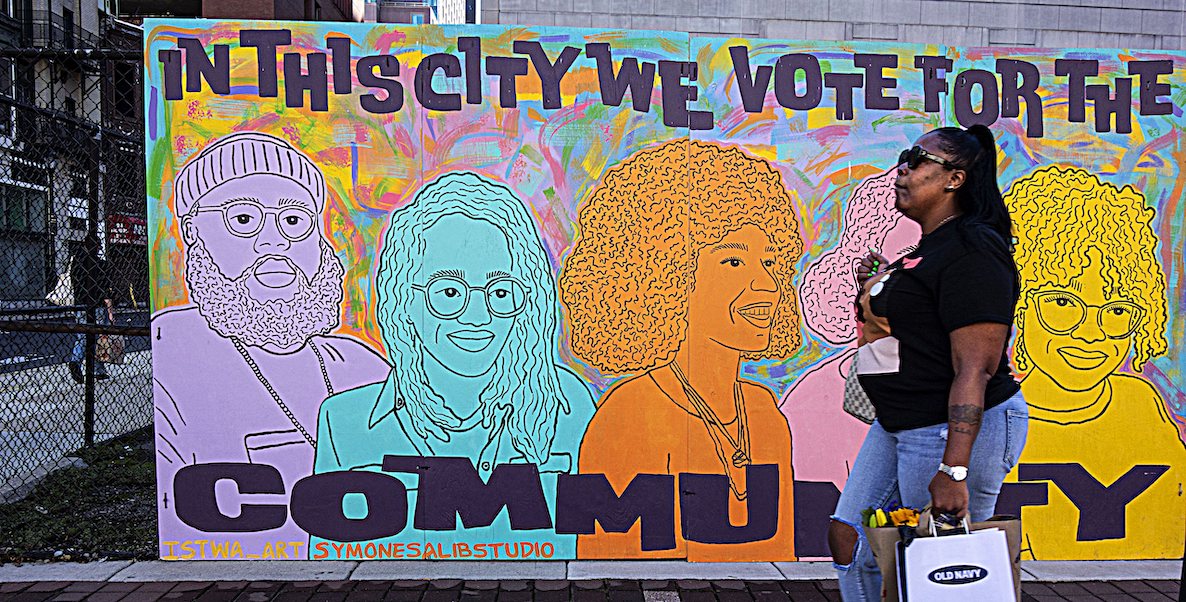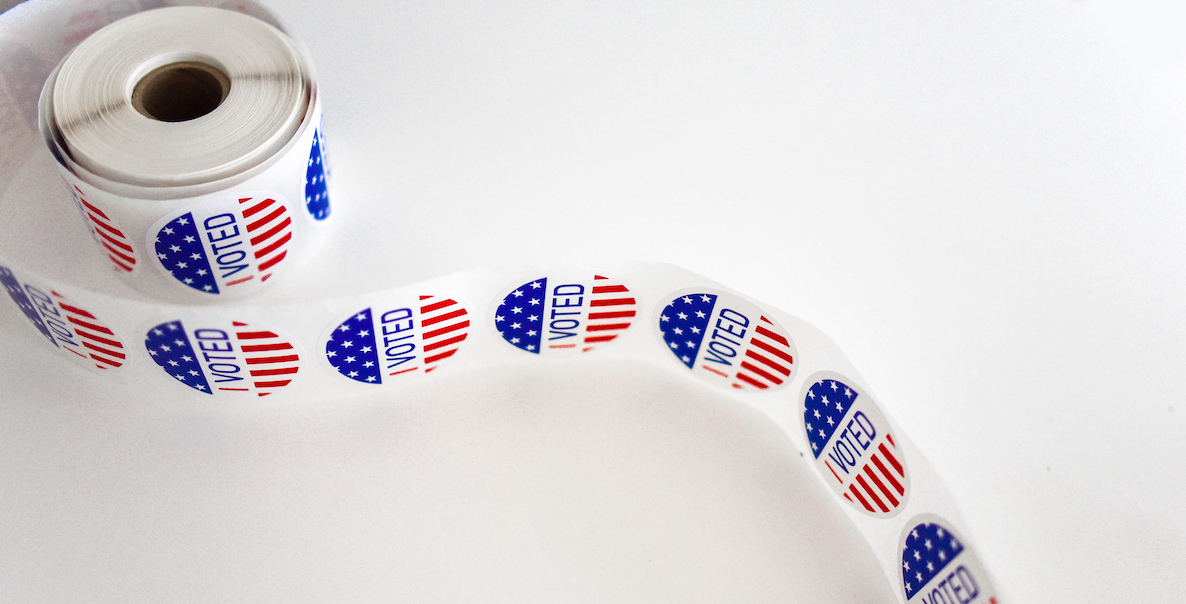The stakes were high in the 2020 election (Remember 2020?) and Philadelphia stepped up. That year, 66 percent of our registered voters cast a ballot — the highest voter turnout since 1984. After 24-hour mid-pandemic ballot counting by people like this guy, Joe Biden won Pennsylvania by 80,555 votes — just about 1 percentage point.
Proving: Every. Vote. Counts.
In 2024, we face another crucial presidential election, with a bunch of essential statewide and local candidates, too. Of course, you’re going to vote. (Right? Not like in 2023, when only a third of Philadelphians voted?)
But your vote alone is not enough this year. So vote — Yes please! — but also consider helping turn out the vote. After all, we live in both a swing state and the birthplace of American democracy. We Philadelphians must step up to ensure our friends, neighbors, young people, older people, everyone votes, in person, by mail, however.
Below, some ideas for how you can help increase voter turnout and help this unprecedented election run smoothly.
Ways to help get out the vote in 2024
1. Register voters
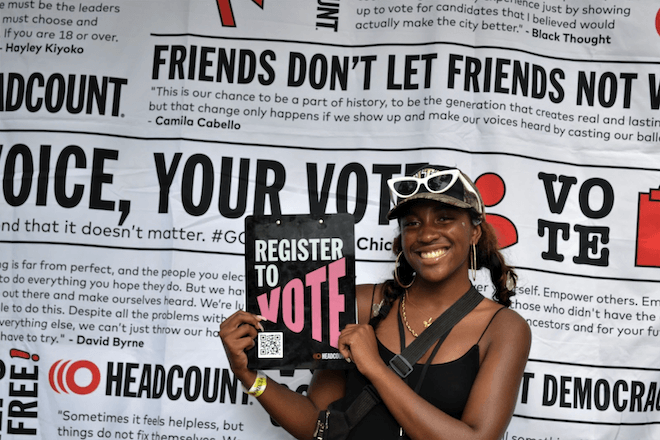
A person can’t vote if they’re not registered. The deadline to register to vote (including online, mail, and in-person registration) is 15 days prior to election day — October 21, 2024. You can register to vote online here, or by mailing this form to your county board of elections, which you can find here. If you’re in Philly, that mailing address is:
The Philadelphia County Board of Elections:
520 N. Columbus Boulevard, 5th Floor
Philadelphia, PA 19123
Need more help? Philadelphia City Commissioners are working on opening satellite election offices in all 10 councilmanic districts. As of printing, one office has opened at 4029 Market Streets. Follow them online for more office openings and information.
Unregistered Philadelphians who can vote but might not be prepared to do so include folks who recently moved and forgot to update their registration, previously incarcerated people — including those on probation or parole — who don’t think they can register (they can; find the guidelines here), and newly eligible 18- to 20-year-olds who have not yet registered. (According to a recent report, just 26 percent of 18-year-olds in Greater Philadelphia are registered.)
If you want to help make sure your friends, family, and neighbors are registered to vote, you can join local organizations like POWER and PA Youth Vote (more on that below) and plug into national registration efforts with Rock the Vote and Register2Vote.
If you’re ready to do it yourself, check out The Philadelphia Citizen’s guide to How to Start A Voter Registration Drive.
September 17 is National Voter Registration Day. Sign up here to plan how you’ll celebrate by getting your fellow citizens to register.
2. Contact your committeeperson
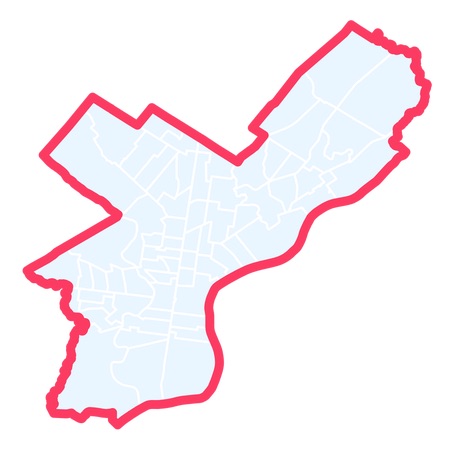
Philadelphia is divided into 1,703 voting divisions, each of which elect four committeepersons (two per major party) for a total of 6,812 committeepersons.
A committeeperson serves as a point of contact between the voters in the division and elected officials. They’re volunteers — receiving no taxpayer-funded compensation — and considered party officers as opposed to public officials or government employees. Their primary responsibility is to help get out the vote for their party. Many committeepeople fulfill this duty all year long, not just on or around Election Day, and stay engaged with their party and community.
Reaching out to your committeeperson helps ensure your efforts to increase voter turnout are not redundant. You may find operations underway that need support from citizens like yourself. In fact, partnering with a committeeperson can be an “on ramp” to yearlong work within your neighborhood, voting division, and beyond.
If you’re playing the long game, this is also an opportunity to begin advocating for long-term change in local politics. While committeepersons are elected every 4 years, the positions are entirely unpaid, and so they frequently become vacant (often a result of people moving to another division). Reaching out to one of your committeepersons now could be a path to joining the ranks yourself. As Philadelphia Citizen voice Malcolm Burnley wrote in 2017, “A committeeperson has the potential to be the connective tissue tying together the city’s social and political spheres, a conduit between the eminently powerful (but not popularly elected) ward leaders and constituents on the block.”
If Philly is going to change its political power structure for the better, committeepersons could lead that charge. (Find your committepersons here.)
3. Deep canvass
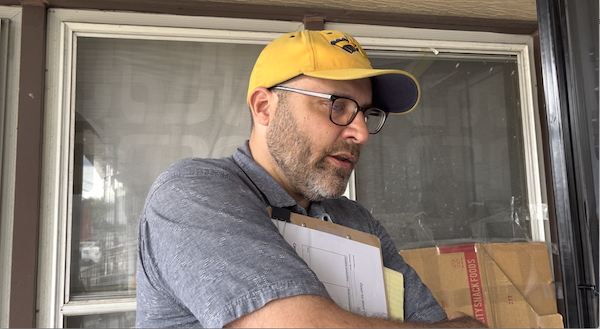
One of the most effective ways to get disillusioned and disinterested people to vote is called deep canvassing. Changing the Conversation for Progress (CTC), a West Philly-based organization that trains people on the method of deep canvassing, reports that telling a deeply personal story — one that’s not even about politics or policy, and instead about someone they love — convinces nonvoters to take action 10 to 15 percent more effectively than regular canvassing. If you really want to change people’s minds about their roles as citizens, strengthen democracy, and promote justice, sign up here.
4. Canvass from your couch
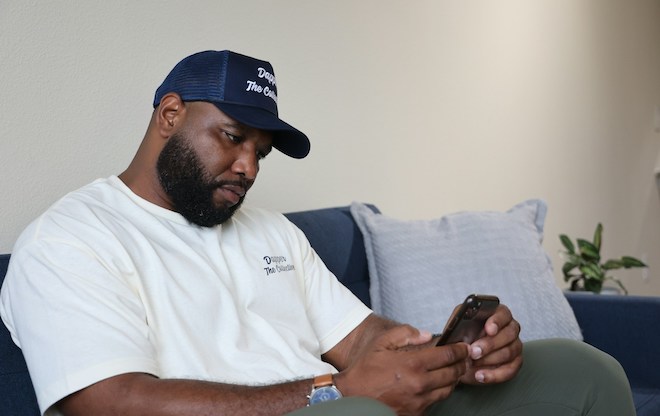
You can help get out the vote with text and phone banking (and social media blitzing) from the comfort and safety of your couch. Reach out to people you know — friends, family, neighbors and colleagues — first.
“I think our own personal networks are often overlooked,” says Jen Devor, co-founder of Better Civics, a nonpartisan nonprofit working to revolutionize civic engagement and voter participation. “We assume that our friends and family are going to vote, but we don’t know — we have to make sure that people are committed and have a plan.”
Pick up the phone or draft a template text including concise details about why you vote, why you think it’s important, and why they should care (personalize that part if you can). And include resources to help them be more informed voters — regarding both the candidates on the ballot and the actual voting process.
“You can tell people to vote all day, but if people don’t go into the polls and make an informed decision, it’s not gonna stick,” says Devor. “It’s not going to create that culture of voting that’s so important.”
Once you’ve covered your own network, plug in with local efforts focused on a cause you believe in like the ACLU’s Pennsylvania phone bank, Vote Forward’s letter-writing campaign; become a Voting Squad Captain with When We All Vote; or campaign for a candidate you support.
5. Be an informed voter, and share how important that is!
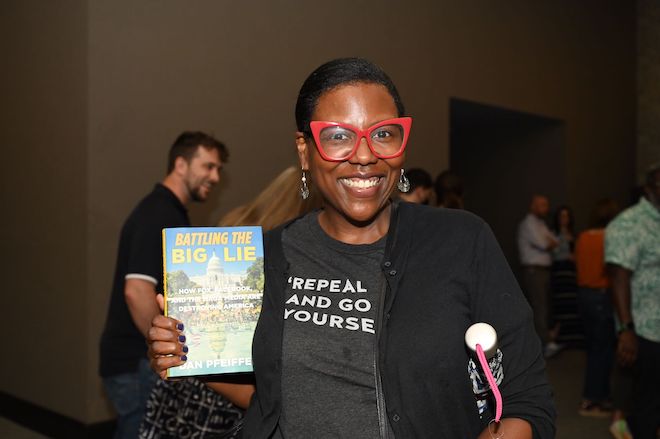
If there’s one thing to say about the runup to 2024 Election Day, it’s been … full of surprises. To keep track of all the potentially changing situations (brokered convention, anyone?), stay up to date on all Election Day news at The Philadelphia Citizen, where we also have you covered with all the local candidates.
The Committee of 70 is contributing to the cause through Voting 101 — its initiative to promote a culture of informed voting and provide resources to answer every question you might have about why it matters.
Find more election news and information on elections, candidates, ballot questions, public policy analysis, even sample ballots for your district at Ballotpedia, the “digital encyclopedia of American politics.” For all things related to protecting your voting rights, check out the official Guide to Federal Voting Rights Laws from the U.S. Justice Department, or read the Know Your Rights: Voting Rights guide from the ACLU that provides links to additional resources and specific scenarios you might encounter of you’re vulnerable to disenfranchisement.
And it’s absolutely essential to make sure you’re getting your election and political news coverage from reliable sources. Check out Rutgers’ guide to evaluating the news, or outsource that research and get NewsGuard, a free browser extension and app that provides detailed information and reliability ratings for tens of thousands of news and information sources.
6. Boost the youth vote

Local organizations like Vote that Jawn and PA Youth Vote provide resources for educators to run voter registration clubs and help kids navigate voter registration, slide decks and handouts for teaching about the 2024 election, and information for parents to help combat misinformation.
National groups like NextGen America, the nation’s largest youth voter organization, and The Civics Center use technology, social media, and direct outreach to schools to help incentivize youth voting and make sure teens know how important it is to get registered and stay informed.
You can get involved with any of these organizations by volunteering or donating to support their work.
7. Help elders vote
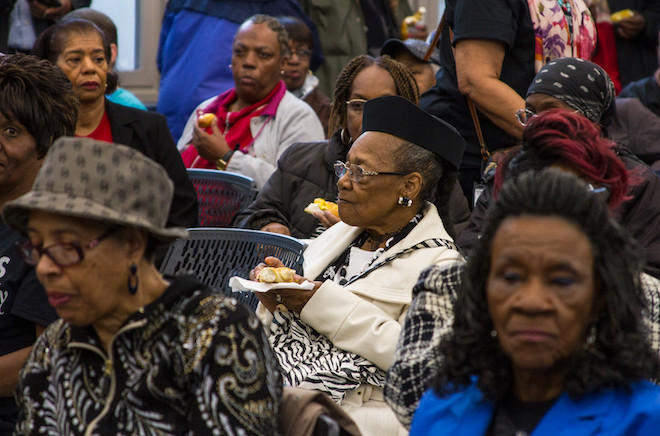
Make sure the older folks in your life stay safe and still vote. Give them a ring and make sure they have a plan, and if they don’t, walk them through the vote-by-mail process. It’s totally legal to help someone else complete the ballot application online or to print one out and drop it off.
Encourage them to mail their ballot as soon as they receive it; it wouldn’t hurt to follow up with another call before October 29 to make sure it’s been sent.
If they want to be there on Election Day, offer a ride! If you can’t be there, it could be beneficial to help them install Lyft or Uber if they have a smartphone, even when it’s not to make sure they can cast their ballot. Bonus: Lyft is offering discounted rides nationwide on Election Day.
8. Work the polls
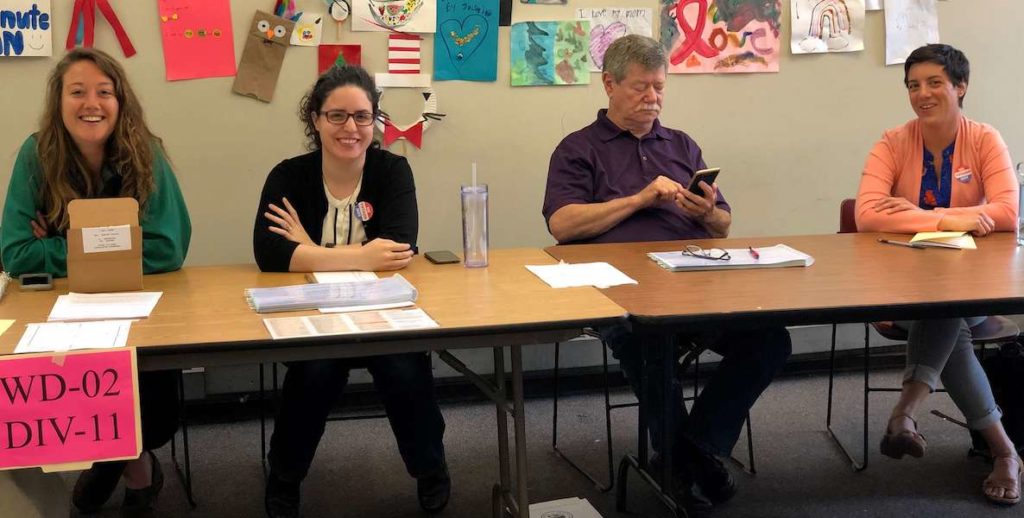
Poll workers are essential to running our elections — and they’re becoming scarce. While this problem has been increasing for years as older, more engaged community members have stepped back, the post-2020 threats made a huge dent in the number of election workers ready for 2024.
There are a variety of ways you can serve your civic duty on Election Day: Open voting machines and close up at the end of the night, check in voters, keep people voting, and poll watching. Training is provided, and you get paid for your service. Philadelphia’s sign-up for poll workers can be found here.
To encourage teen interest in civics, Philadelphia’s Office of the City Commissioners also runs the Involved at 17 Program for students 17 years of age and older on Election Day to be poll workers. (Here are more ideas for involving under-18-year-olds in voting.)
Join the Poll Worker Caucus Facebook group to learn more and stay in the loop. The Committee of 70 also provides a list of resources, training 101, and Q&As for new poll workers who still have questions.
9. Vote early
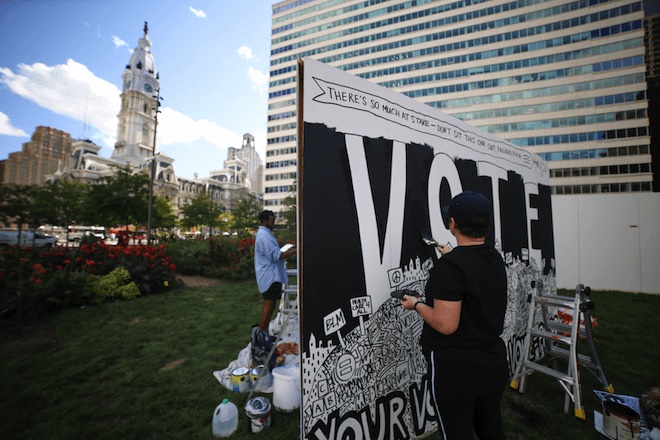
If you don’t plan to vote in person, being proactive is the name of the game. You can apply for your mail-in ballot now and begin voting 50 days before Election Day via mail-in or absentee ballot.
If you like the in-person touch but still don’t want to wait until the last minute, you can vote early by going to your county elections office in person, requesting a ballot, completing it, and returning it through Tuesday, October 29 at 5pm.
We can’t predict the impact of potential USPS slowdowns, so it’s best to allow plenty of time for your ballot to reach the commissioner’s office. Send yours in as soon as you receive it (after September 16, of course).
10. Advocate for legislative action
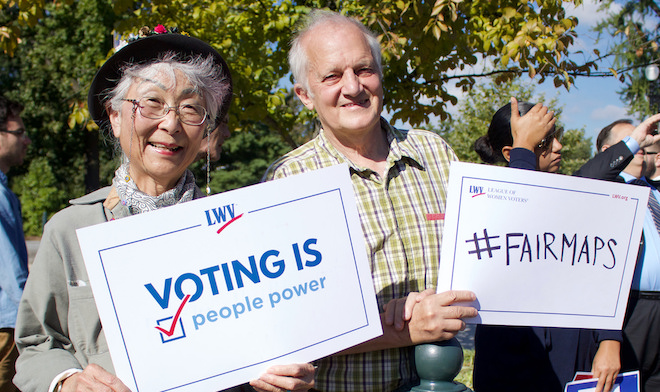
PA’s 5-year-old election reforms helped make voting easier in the state, but we still have a ways to go before the first duty of every citizen is as easy as it should be.
- Our mail-in ballot system requires us to request them every year — why not send them to registered voters automatically?
- Efforts to hold open primaries in Pennsylvania, where unaffiliated voters can vote in the Democratic or Republican primaries, have been stalled in our legislature. Open primaries ensure everyone has a say in who the candidates are. Why restrict that?
- Another way to increase the candidate pool and build more representation in the general election both locally and nationwide is through ranked-choice voting. Find out how it works and where it’s being used today here.
- Millions of Pennsylvanians send mail-in ballots in the weeks before Election Day, but they are not opened or counted until 7am on Election Day. This not only strains the efforts of poll workers but also delays results.
- On Election Day, the polls are open from 7am to 8pm. If you haven’t requested a mail-in ballot, and you haven’t gotten to your county elections office in person before 5pm on October 29, Election Day is your very last chance to cast your ballot. If you have work, family, or anything else that takes up your daytime hours, this is just one more way to miss your chance to vote. And what if you want to work the polls, but can’t get the PTO? Why not make Election Day a national holiday? Isn’t it that important to the country?
That’s the message we need to send to our legislators. Reach out to your representatives — especially those who are up for reelection — and ask them to finally take action on making voting, the most basic of responsibilities for every citizen to make democracy function, easier for everyone.
 Every Voice, Every Vote funds Philadelphia media and community organizations to expand access to civic news and information. The coalition is led by The Lenfest Institute for Journalism. Lead support for Every Voice, Every Vote in 2024 and 2025 is provided by the William Penn Foundation with additional funding from The Lenfest Institute for Journalism, Comcast NBC Universal, The John S. and James L. Knight Foundation, Henry L. Kimelman Family Foundation, Judy and Peter Leone, Arctos Foundation, Wyncote Foundation, 25th Century Foundation, and Dolfinger-McMahon Foundation.
Every Voice, Every Vote funds Philadelphia media and community organizations to expand access to civic news and information. The coalition is led by The Lenfest Institute for Journalism. Lead support for Every Voice, Every Vote in 2024 and 2025 is provided by the William Penn Foundation with additional funding from The Lenfest Institute for Journalism, Comcast NBC Universal, The John S. and James L. Knight Foundation, Henry L. Kimelman Family Foundation, Judy and Peter Leone, Arctos Foundation, Wyncote Foundation, 25th Century Foundation, and Dolfinger-McMahon Foundation.
![]() IT’S ELECTION SEASON IN PHILADELPHIA. ARE YOU ALL SET TO VOTE?
IT’S ELECTION SEASON IN PHILADELPHIA. ARE YOU ALL SET TO VOTE?



